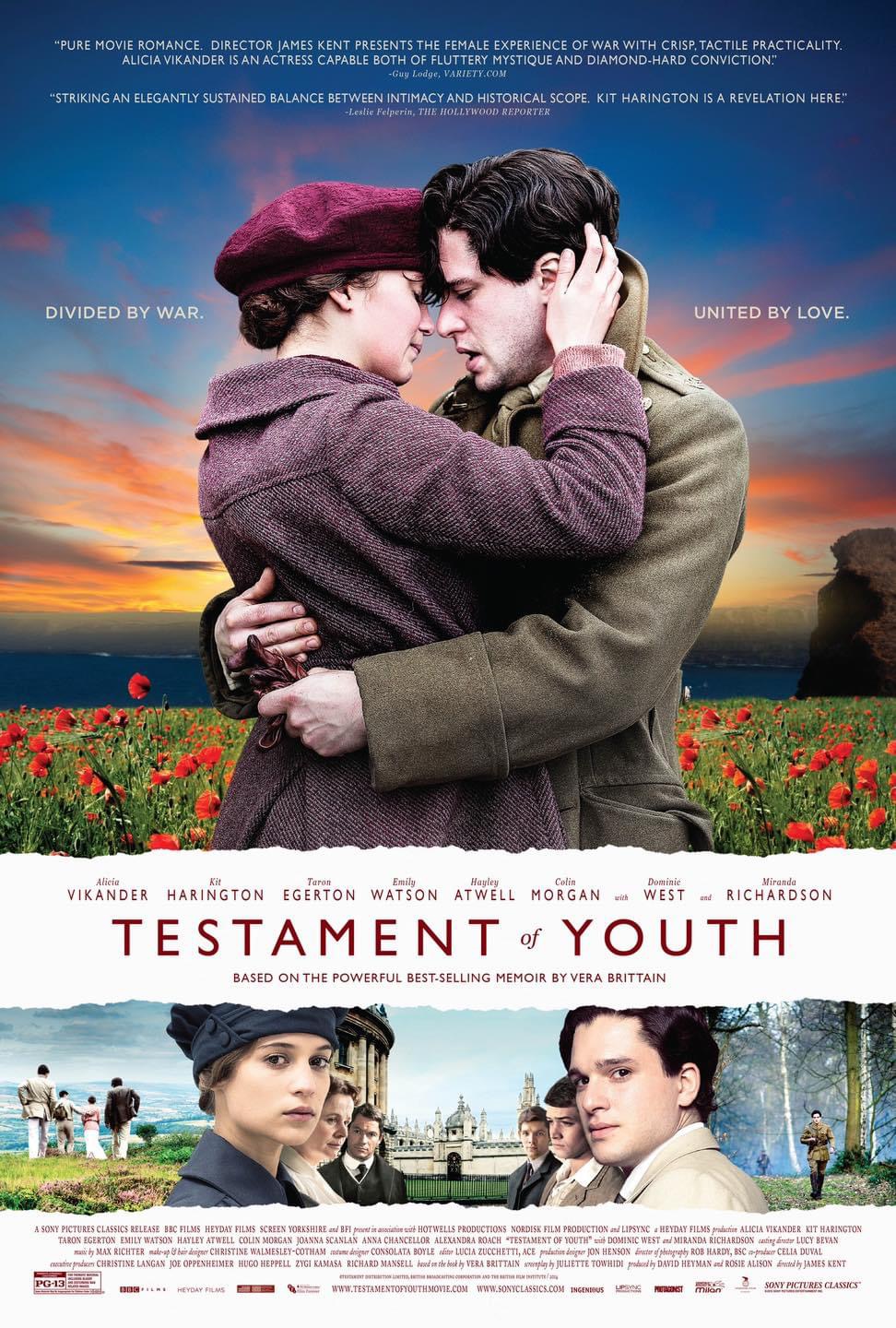Testament of Youth (2014)

Testament of Youth (2014), directed by James Kent, is a profound and moving adaptation of Vera Brittain’s World War I memoir. Starring Alicia Vikander as Brittain, the film takes viewers through her harrowing experiences during the Great War, transforming her from a young woman with ambitious dreams to an enduring pacifist haunted by personal losses. The film’s quiet intensity and richly emotional storytelling offer a deeply personal perspective on the cost of war, highlighting themes of love, loss, resilience, and remembrance.
Suggested videos for you:
Plot Summary
Set in England on the eve of World War I, Testament of Youth introduces us to Vera Brittain (Alicia Vikander), a spirited young woman determined to attend Oxford University despite societal expectations that women of her class focus on marriage rather than education. Supported by her brother Edward (Taron Egerton) and close friends Victor Richardson (Colin Morgan) and Roland Leighton (Kit Harington), Vera channels her intellect and ambition into breaking traditional barriers. Her bond with Roland deepens into a tender romance, and her future seems hopeful.
However, the outbreak of war in 1914 shatters these dreams. Edward, Roland, and Victor enlist, carried by a sense of duty and idealism, leaving Vera to grapple with the impact of their decision. Moved by her loved ones’ sacrifices, Vera decides to leave Oxford and join the war effort as a nurse. Her work in the hospitals exposes her to the gruesome realities of the battlefield, revealing war’s devastation in visceral detail. As she watches her loved ones fall to the horrors of war, Vera’s romanticized view is stripped away, leaving her to confront the depth of her grief and the stark costs of nationalism and duty.
By the end of the war, Vera returns to England deeply scarred but resolute in her commitment to peace. Her experiences, memorialized in her memoir, become a tribute to those lost and a powerful anti-war statement, urging future generations to consider the true toll of conflict.
Themes and Symbolism
Testament of Youth stands as a meditation on the brutal, lasting cost of war on both soldiers and civilians. Through Vera’s journey, we see how war ripples outward, affecting not only the men on the front lines but also the families and loved ones left behind. The film emphasizes the futility and devastation of war, challenging any lingering idealism about the “glory” of battle. Instead, it presents the tragedy of lives cut short and dreams deferred, making its anti-war stance deeply personal and resonant.
The film also tackles themes of resilience and healing. Vera’s narrative is about survival, but it’s also about transformation—enduring pain and finding purpose in it. Her decision to abandon her academic ambitions to serve as a nurse is an act of courage, as she confronts unimaginable suffering in a bid to bring solace and healing. Vera’s resilience shines through her actions and her eventual commitment to pacifism, her memoir serving as both a cry for peace and a testament to the need for remembrance.
The theme of memory is central to the story. Vera’s decision to write her memoir reflects her desire to preserve the legacy of those she loved, honoring their lives and ensuring their sacrifices are not forgotten. In a larger sense, the film reflects the responsibility of the living to remember the dead, bearing witness to their struggles and allowing their stories to warn against the violence of the past.
Cinematography and Visual Style
Cinematographer Rob Hardy uses a visual style that enhances the emotional weight of the narrative, balancing the beauty of pre-war England with the harshness of war’s toll. Early scenes bathed in warm, gentle light portray Vera’s life before the war, capturing the tranquility and promise of youth. The vibrant greens and open landscapes evoke a sense of innocence and hope that will later contrast sharply with the desolation that war brings.
As the story progresses, the color palette shifts, becoming muted and somber, mirroring the destruction of the characters’ world. The depictions of wartime hospitals are hauntingly realistic, with subdued lighting and neutral tones capturing the exhaustion and despair Vera faces daily. The visual approach avoids sensationalism, instead focusing on the physical and emotional toll that is written on the faces of the wounded soldiers and their caregivers.
This visual contrast between pre-war and wartime scenes underscores the profound impact of the war on both Vera’s psyche and her surroundings, reinforcing the film’s themes of innocence lost and a world irrevocably changed.
Score and Music
Max Richter’s score for Testament of Youth is essential to the film’s emotional impact, using minimalist arrangements of piano and strings to heighten the poignancy of Vera’s experiences. Richter’s compositions are delicate and haunting, accompanying Vera’s journey from hope and love to loss and sorrow. The score captures the essence of reflection and grief, with its restrained beauty providing a somber background that never overwhelms the narrative but deepens it.
Richter’s music enriches the film’s tone, particularly in scenes of introspection or quiet devastation. It amplifies the film’s sense of longing and remembrance, reflecting Vera’s internal struggle and her resolve to preserve the memories of those she lost. In the film’s most painful moments, the score becomes a silent elegy, honoring the fallen and underscoring Vera’s grief in a way that words alone cannot convey.
Performances
Alicia Vikander’s portrayal of Vera Brittain is the heart of Testament of Youth, capturing Vera’s intellectual curiosity, fierce independence, and resilience. Vikander brings authenticity and emotional depth to the role, showing Vera’s transformation from a determined, idealistic young woman to someone scarred but unbroken by grief. Her performance is both understated and powerful, reflecting the quiet strength that allowed Brittain to survive and ultimately find purpose in her loss.
Kit Harington as Roland Leighton offers a heartfelt portrayal of a young man whose romantic idealism is gradually worn down by the horrors of war. His chemistry with Vikander is genuine, and their romance is tender yet tinged with the foreboding knowledge of impending loss. Taron Egerton as Edward Brittain and Colin Morgan as Victor Richardson also deliver memorable performances, portraying the innocence, bravery, and vulnerability of young men whose lives are abruptly cut short by the war.
Emily Watson and Dominic West as Vera’s parents add depth to the narrative, depicting the complex emotional landscape of a family trying to support each other amid growing fear and grief. The ensemble cast complements Vikander’s performance, collectively creating a portrayal of a community struggling to cope with the ravages of war.
Historical Context and Real-Life Impact
Based on Vera Brittain’s memoir, Testament of Youth is rooted in real-life experiences that capture the trauma and transformation of a generation affected by World War I. Brittain’s work, published in 1933, was a groundbreaking account of war from a female perspective, challenging romanticized narratives of patriotism and sacrifice. By focusing on Brittain’s perspective, the film sheds light on the often-overlooked role of women in wartime, particularly those who served as nurses or caregivers and bore witness to the war’s human cost.
Brittain’s decision to chronicle her losses and her eventual activism as a pacifist lend a historical and emotional depth to the film. Her memoir has influenced generations with its anti-war message, reminding readers of the urgent need for remembrance and the moral responsibility to honor those who suffered.
Reception and Cultural Impact
Testament of Youth received praise for its thoughtful approach to Brittain’s story, its visual elegance, and Vikander’s outstanding performance. Many critics noted that while the film may not appeal to those looking for a traditional war drama, its unique perspective provides a powerful exploration of grief and resilience. The film has found a dedicated audience, particularly among those interested in anti-war narratives, history, and feminist perspectives on wartime experiences.
The film’s focus on the emotional and psychological impact of war has resonated with audiences, offering an intimate portrait of a woman’s journey through loss and healing. Testament of Youth serves as a reminder of the real human costs behind historical events and the importance of personal testimony in preserving the stories of those affected.
Conclusion
Testament of Youth is a deeply moving portrayal of one woman’s experience of love, loss, and transformation against the backdrop of one of history’s most devastating conflicts. With its beautiful cinematography, evocative score, and nuanced performances, the film honors Vera Brittain’s legacy while capturing the universal, timeless themes of grief and resilience. Vikander’s performance as Brittain, combined with the film’s restrained yet powerful storytelling, creates a tribute to those who suffered during the war and a powerful anti-war message.
Through Vera’s story, Testament of Youth emphasizes the importance of memory and the ethical duty to honor the past. It is a film that speaks to the enduring scars of war and the necessity of remembrance, reminding us of the humanity at the heart of history and the individuals whose lives are forever changed by conflict.











